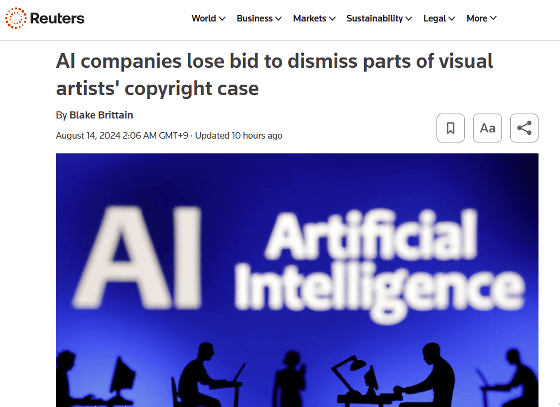Court allows human artists to move forward with copyright infringement lawsuits against generative AI companies like Stability AI and Midjourney

While the companies developing generative AI claim that the use of human artists' works as training data for generative AI is fair use , the artists accuse them of copyright infringement. Meanwhile, the U.S. District Court for the Northern District of California has ruled (PDF file) that a copyright infringement lawsuit filed by several artists against generative AI developers such as Stability AI and Midjourney can proceed.
AI companies lose bid to dismiss parts of visual artists' copyright case | Reuters
https://www.reuters.com/legal/litigation/ai-companies-lose-bid-dismiss-parts-visual-artists-copyright-case-2024-08-13/

Artists' lawsuit against Stability AI and Midjourney gets more punch - The Verge
https://www.theverge.com/2024/8/13/24219520/stability-midjourney-artist-lawsuit-copyright-trademark-claims-approved
Artists celebrate AI copyright infringement case moving forward | VentureBeat
https://venturebeat.com/ai/artists-celebrate-as-copyright-infringement-case-against-ai-image-generators-moves-forward/
Many image-generating AIs are trained on datasets that contain works created by human artists, some of which are copyrighted. In January 2023, several artists filed a class action lawsuit against Stability AI, Midjourney, and the image sharing site DeviantArt .
Although DevianArt, one of the three defendants, does not develop AI in-house, images posted to DevianArt were copied into the AI dataset 'LAION-5B' and used as is to train Stable Diffusion. DevianArt has also released a paid app 'DreamUp' based on Stable Diffusion.
However, in October of that year, Judge William Orrick of the U.S. District Court for the Northern District of California dismissed the class action lawsuit, finding the plaintiffs' claims to be flawed.
A class action lawsuit by artists who claim that the image generation AI 'Stable Diffusion' and 'Midjourney' have infringed the copyrights of their works is dismissed by the court - GIGAZINE

However, Judge Orrick allowed the plaintiffs to amend and refile the complaint, so they filed again the following November. The amended complaint also added Runway AI , a developer of video generation AI, as a defendant.
On August 13, 2024, Judge Orrick ruled that the plaintiffs’ copyright infringement claims were sufficiently alleged to proceed to the discovery phase, allowing the plaintiffs’ lawyers to examine the AI developers’ internal documents and conduct detailed investigations into the training datasets, mechanisms, and internal structure of the generative AI.
'This case alleges that Plaintiffs' claims in Stable Diffusion are based to a significant extent on copyrighted works, and that the operation of the product necessarily evokes copies or protected elements of those works. Whether this is by design, as Plaintiffs allege, or the result of a defect, as Stability AI alleges, remains to be examined,' Judge Orrick wrote, without discussing the plaintiffs' claims or the defendants' defenses.
In addition to copyright infringement, Midjourney was also sued for trademark infringement, alleging that the list it claimed users could use to generate work in the same style included 4,700 unauthorized artists.
On the other hand, Judge Orrick did not find all of the plaintiffs' claims valid. He dismissed claims that the companies violated the Digital Millennium Copyright Act (DMCA) by removing or altering copyright management information, and that DevianArt violated its terms of use by allowing users to scrape their works for AI training datasets.
Kelly McKernan, one of the plaintiffs, commented in a post on X, 'This is very exciting news for the AI litigation! The judge ruled in favor of our copyright claims, and our investigation will now allow us to learn everything these companies don't want us to know. This is a huge win for us. I'm so proud of my incredible team of lawyers and my fellow plaintiffs!'
Very exciting news on the AI lawsuit! The judge is allowing our copyright claims through & now we get to find out allll the things these companies don't want us to know in Discovery. This is a HUGE win for us. I'm SO proud of our incredible team of lawyers and fellow reporters! pic.twitter.com/jD6BjGWMoQ
— Kelly McKernan (@Kelly_McKernan) August 12, 2024
Related Posts:






